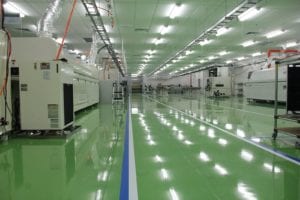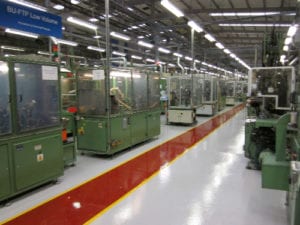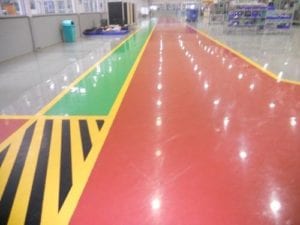7 Benefits Warehouse Epoxy Flooring | How To Install Warehouse Epoxy Floor? | Epoxy Pros and Cons
Types of Warehouse Flooring Options| Benefits of Warehouse Epoxy Flooring | Advantages and Disadvantages of Warehouse Epoxy Flooring
Warehouse Flooring
Warehouse Flooring is one of the most important aspects of a warehouse in the modern-day, as it provides safety and comfort for warehouse workers while they are on the job.
With many different material options to choose from, the warehouse flooring needs to be durable and able to withstand even the most extreme of conditions.
- The first step to picking the right flooring for your warehouse is knowing what you need.
- The next step is knowing what the different options are and how they can be used.
- Find a company with the best flooring choice. In order for you to find the best company that can help you with your warehouse flooring needs, this list will contain some of the most important things you should look for:
- What options do they have for the flooring?
- What types of costs are associated with each of the options you are looking into?
- How long have they been in business, as you want a company that has a lot of experience in the warehouse flooring industry.
- What is their reputation like, as it will be important to find a company that has a good reputation that needs to be made aware of if you plan on working with them in the future and ordering more warehouse flooring material?
- What kind of guarantees are they offering, as this will help you know if the company is confident in their warehouse flooring products?
- What kind of customer service does the company offer, as you want to feel like your business is appreciated.
Types of Warehouse Flooring Options
- Concrete: Concrete is a very effective material for warehouse flooring, as it is nonporous which allows for easy cleaning and maintenance.
And since it can be created to suit the needs of the building, and you can add different things into the concrete to enhance it, you can make it a little more decorative which your workers will like. It is also relatively cheap when compared with other types of warehouse flooring.
- Epoxy: Epoxy is a great option for warehouse flooring, as it allows for you to create different kinds of effects on the floor, depending on what kind of look you are going for.
You can have a metallic finish or a plain finish, meaning that there are different kinds of looks that you can choose from.
- Hardwood: Hardwood is an elegant type of flooring that looks great in warehouses. Since this material offers natural elegance and beauty, it can help your warehouse look like more of an office building than a warehouse.
- Linoleum: Linoleum is a type of material that you might have seen in your grandparents’ home back in the day. This flooring option has a lot of benefits, including being inexpensive as well as easy to install.
- Rubber: Rubber is a nice option for warehouse flooring, as it is not only durable but also very comfortable to walk on.
A lot of people will choose rubber flooring if they find that they are doing a lot of walking and running around the warehouse.
- Cork Flooring: Cork flooring is one of the best options for warehouse flooring, as it is both durable and comfortable to walk on. This type of material also has a nice decorative look which will look great in warehouses.
- Vinyl: Vinyl is a great type of flooring option for warehouses, because it can be easily installed by workers without having to be highly skilled in construction. And since it is affordable and available in many different colors, you will have no problems finding one that looks good with your warehouse décor.
Warehouse Epoxy Flooring
What is warehouse epoxy flooring?
Epoxy flooring is a type of floor that is made by applying an epoxy-like substance onto the surface of the floor. It is one of the most durable types of floors, and one of the most effective ones as well.
The warehouse flooring is made up of epoxy resin mixed with industrial-strength abrasive particles. The flooring is durable, resistant to water, and a variety of stains.
The epoxy resin has a long-life span, typically lasting 10 to 20 years. Epoxy resin flooring is available in many color pigments so no matter what color your warehouse floors are the white will go with any color.
The warehouse flooring provides excellent traction but also comes with an excellent slip resistance rating.
The slip resistance of the floor is tested using a wet ice test which measures the coefficient of friction between material and ice at 0 degrees Fahrenheit
Benefits of Warehouse Epoxy Flooring
- It is extremely durable and will last a long time, as it is resistant to water damage, dirt, and also mold.
- It is naturally anti-slip, which means that workers won’t have to worry about slipping on the floor when they are working at their computers or moving around the warehouse to perform tasks.
- It provides a 24/7 slip resistant surface for workers who need to walk from one section of the warehouse to another during their shift.
- It is oil free, which means that you will not have to deal with any kind of cleanup or maintenance processes for this type of flooring system.
- It is highly durable, which means that it will be able to withstand the most extreme of warehouse conditions, making it a great choice for warehouses where materials are transported on a regular basis and have to be handled with care.
- It is very easy to clean, meaning that your workers will not have to have heavy maintenance processes to keep this flooring in good condition.
How To Install a Warehouse Epoxy Floor?
Step by step installing a warehouse epoxy floor.
Preparing the Floor Surface
To begin, all new resin flooring requires some type of preparation. This might range from minor rotary sanding or cleaning to very intensive preparation involving the removal and reduction of floors by up to 5-20mm.
Use diamond grinding because it’s a really effective method of preparation. It not only prepares a floor but also smooths and refines it to improve the performance and appearance of the resin flooring system.
Preparation can take anywhere from a few hours to several days. For example, whether we are removing latex, glue, or vinyl, the preparatory stage may take the longest.
Application of Prime coat
After the floors have been prepared, they are primed. This can be the initial coat of high-build epoxy resin (for our entry-level floor) or a water-based coating.
You can apply it with a roller, but it is best to do it with a squeegee. Once you have your initial coat down, you will want to let it dry completely before the second coat is applied.
Priming may also take the shape of a damp-proof membrane when a floor is prone to dampness, or oil tolerant primers where a floor is susceptible to oil contamination.
Apply Epoxy Resin
Mix epoxy solutions together using a drill and stirring bit according to the manufacturer’s instructions. Pour the mixture into a second bucket and power-mix the paint again to achieve perfect blending.
To paint the floor, use a 9-inch-wide roller with a medium nap. Connect the roller to a pole. Then, dip the roller into the epoxy bucket, covering only the bottom half of the roller.
This fills the roller with the appropriate amount of epoxy. Apply epoxy to the garage floor in a large “W” pattern, working in a 4-foot-square area.
Backroll the pattern to fill it in and erase any roller marks. To prevent visible seams from appearing, keep the edges damp as you progress from portion to section.
Allow the first coat to dry according to the manufacturer’s recommendations before second coat.
Apply the seal coat
To finish the floor, some flooring requires a seal coat (this is not the case for hygiene floors as the top coat in the previous stage is the final floor).
Water-based polyurethane seal coats (often used for comfort floors) or transparent epoxy resin seal coats are both options.
Joints
The final stage is determining whether or not joints are required in the finished floor. Joints are essential to assist the floor in expanding and contracting.
Floors also shrink back after they dry. If the concrete floor beneath had joints, we must reflect that on the surface because the floor will move.
Concrete warms and cools as it moves through the seasons, therefore unless you allow for mobility, you will get cracks in the floor.
To allow for movement, joints are saw cut in with a vacuum assisted floor saw and then restored with a joint compound.
Cost of Epoxy Floor Per Square Foot
Professional epoxy flooring installation ranges between $3 and $12 per square foot, including materials and labor.
The cost of equipment and materials alone will range between $2 and $5 per square foot. Epoxy flooring is a coating or paint system that is frequently created by combining two different materials.
Why choose epoxy industrial-strength, durable surface for your warehouse.
Reasons why your warehouse should use epoxy industrial strength, durable surface
- The reason why you would choose this type of flooring is that it allows for workers to walk relatively safely and with ease. This means that you will have a significantly more productive workforce, as they will not be struggling with the ground beneath their feet.
- It is very easy to clean
- It is very durable
- It is light weight and easy to install, meaning that the workers will be able to work without having to stop and re-install the floor whenever they need to walk somewhere else in the warehouse.
- It has certain safety reasons as well, as it provides a slip resistant surface, making it much safer for workers when they are working at their computers or doing other tasks with their feet while walking around the warehouse.
- It has a unique pattern which will make it look great in certain warehouses, such as those that have a decorative design.
Epoxy floor coatings to your warehouse is a solid investment and has over the years received many positive reviews from homeowners and business professionals alike. Though there is a wide variety of floor finish choices, epoxy flooring remains the best option for industrial and commercial facilities.
Advantages of Warehouse Epoxy Flooring

-
Enhanced appearance
Your warehouse doesn’t need a cool design and creative décor. But it must look professional. Available in a wide range of colors and styles, epoxy floor coatings can cover the boring, ugly concrete floor along with minor imperfections, such as superficial cracks, making it more appealing.
-
Ease of maintenance
Besides improving the appearance of your warehouse, an epoxy coating will transform your regular concrete floor into a non-porous, smooth, stain-repellent surface that can easily be wiped free of dust, dirt, and debris. Furthermore, you no longer have to worry about the bacteria that typically hide in porous concrete surfaces.
-
Impressive durability
Epoxy floor coatings deliver some hard-wearing, durable flooring solutions that can withstand intense foot traffic as well as normal warehouse equipment like forklifts without showing any signs of wear and tear. Industrial epoxy flooring solutions also have a long lifespan and make concrete floors chemical resistant, saving businesses thousands of dollars in floor repairs.
-
Cost effectiveness
Because epoxy flooring is less expensive, lasts longer, and resists impact damage much better than other floor finishes, it’s the most cost-effective flooring option for warehouses. Additionally, epoxy flooring reflects light, reducing lighting costs, and can be applied to different thicknesses, which makes it appropriate for a wide range of applications.
-
Increased productivity
Allowing for faster inventory movement through the warehouse, minimizing machine breakdown along with employee downtime, and reflecting light to improve brightness in working areas by up to 300 percent, epoxy flooring can substantially increase the productivity in your warehouse.
-
Improved safety
Developed with safety in mind, epoxy flooring products are resistant to slippage, fire, and impact. You can also use different colors to define specific zones in your warehouse, such as forklift traffic zones, work zones, and safety zones.

In addition, applying an epoxy coating to your concrete floors will help prevent concrete dusting, which results from the disintegration of the porous, unsealed concrete floor surface under traffic. Besides collecting on inventory items and damaging equipment, concrete dust poses real health risks to workers.
-
Minimum business disruption
Epoxy floor coatings are easy and fast to install, which means that you don’t have to interrupt your business operations for a long time. As soon as the floor dries out completely, you can resume your regular warehouse activities.
.
Disadvantages of Warehouse Epoxy Flooring
-
It is Expensive
Epoxy floorings are expensive when compared with standard warehouse flooring.
-
It is Easy to Scratch
It is also easy to scratch. So, if you have a lot of heavy equipment going around, it could cause damage to the flooring.
-
It is Hard to Install
And it is a lot harder to install than standard concrete warehouse flooring.

